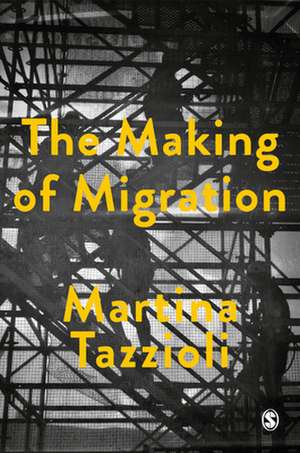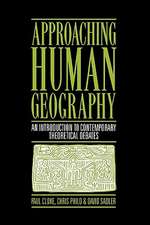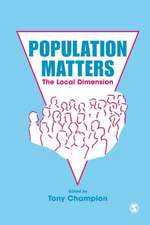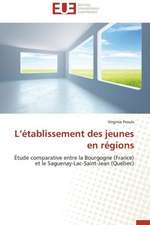The Making of Migration: The Biopolitics of Mobility at Europe’s Borders: Society and Space
Autor Martina Tazziolien Limba Engleză Paperback – 20 noi 2019
Bringing together an ethnographically grounded analysis of migration, and a critical theoretical engagement with the security and humanitarian modes of governing migrants, the book pushes us to rethink notions that are central in current political theory such as “multiplicity” and subjectivity. This is an innovative and sophisticated study; deploying migration as an analytical angle for complicating and reconceptualising the emergence of collective subjects, mechanisms of individualisation, and political invisibility/visibility.
A must-read for students of Migration Studies, Political Geography, Political Theory, International Relations, and Sociology.
| Toate formatele și edițiile | Preț | Express |
|---|---|---|
| Paperback (1) | 306.20 lei 3-5 săpt. | +17.42 lei 4-10 zile |
| SAGE Publications – 20 noi 2019 | 306.20 lei 3-5 săpt. | +17.42 lei 4-10 zile |
| Hardback (1) | 791.46 lei 6-8 săpt. | |
| SAGE Publications – 20 noi 2019 | 791.46 lei 6-8 săpt. |
Preț: 306.20 lei
Nou
Puncte Express: 459
Preț estimativ în valută:
58.60€ • 60.95$ • 48.38£
58.60€ • 60.95$ • 48.38£
Carte disponibilă
Livrare economică 25 martie-08 aprilie
Livrare express 08-14 martie pentru 27.41 lei
Preluare comenzi: 021 569.72.76
Specificații
ISBN-13: 9781526464040
ISBN-10: 1526464047
Pagini: 184
Dimensiuni: 156 x 234 x 11 mm
Greutate: 0.28 kg
Ediția:1
Editura: SAGE Publications
Colecția Sage Publications Ltd
Seria Society and Space
Locul publicării:London, United Kingdom
ISBN-10: 1526464047
Pagini: 184
Dimensiuni: 156 x 234 x 11 mm
Greutate: 0.28 kg
Ediția:1
Editura: SAGE Publications
Colecția Sage Publications Ltd
Seria Society and Space
Locul publicării:London, United Kingdom
Recenzii
The Making of Migration is a timely and extremely original book. Analyzing at the same time technologies of control and migrants’ practices of resistance it casts migration as a battleground. And it compels us to test and rethink our political vocabulary within that battleground.
Sandro Mezzadra, Associate Professor of Political Theory, the University of Bologna.
In The Making of Migration, Martina Tazzioli invites us to truly examine how “migration and “migrants” are in fact made. Refusing to permit the lazy complacencies of treating these as self-evident sociological categories, Tazzioli aims a sharp critical lens on the governmentalities at stake in subjecting human mobility to various forms of control and government as well as knowledge production, while simultaneously never ceasing to see the struggles of people on the move across borders as central and constitutive of the making of their own “migrant” subjectivities. Mobility then emerges as a stake for both migrants and the border regimes invested in governing them as such. In all of this, Tazzioli also keeps us focused on the ways that these processes of subject-making are at once individualizing and also generate various kinds of collectivities. This book is a rich and original contribution to migration and border studies, and also a major intervention into political philosophy.
Nicholas De Genova, Professor and Chair of the Department of Comparative Cultural Studies, University of Houston.
The Making of Migration radically shifts the analytical categories through which we understand how migration is governed. By proposing a new analytical lexicon of migrant multiplicities and singularities as different from both individuals and populations, Martina Tazzioli changes the direction of research on migration by inserting the political dimensions of subjectification-subjection and objectivation-subjectivation. Through the lens of migration, the book challenges the central categories of political thought and develops a much-needed bridge between migration studies and critical questions of power, politics and spatiality.
Sandro Mezzadra, Associate Professor of Political Theory, the University of Bologna.
In The Making of Migration, Martina Tazzioli invites us to truly examine how “migration and “migrants” are in fact made. Refusing to permit the lazy complacencies of treating these as self-evident sociological categories, Tazzioli aims a sharp critical lens on the governmentalities at stake in subjecting human mobility to various forms of control and government as well as knowledge production, while simultaneously never ceasing to see the struggles of people on the move across borders as central and constitutive of the making of their own “migrant” subjectivities. Mobility then emerges as a stake for both migrants and the border regimes invested in governing them as such. In all of this, Tazzioli also keeps us focused on the ways that these processes of subject-making are at once individualizing and also generate various kinds of collectivities. This book is a rich and original contribution to migration and border studies, and also a major intervention into political philosophy.
Nicholas De Genova, Professor and Chair of the Department of Comparative Cultural Studies, University of Houston.
The Making of Migration radically shifts the analytical categories through which we understand how migration is governed. By proposing a new analytical lexicon of migrant multiplicities and singularities as different from both individuals and populations, Martina Tazzioli changes the direction of research on migration by inserting the political dimensions of subjectification-subjection and objectivation-subjectivation. Through the lens of migration, the book challenges the central categories of political thought and develops a much-needed bridge between migration studies and critical questions of power, politics and spatiality.
Cuprins
Introduction
Chapter 1: Migrant mobs. The (un)making of migrant multiplicities
Chapter 2: Migrant singularities. Between subjectivation and desubjugation
Chapter 3: Digital multiplicities and singularities. (In)visibility and data circuits
Chapter 4: “Keeping on the move without letting pass”. Dispersal and mobility as technologies of government
Chapter 5: Migrant spatial disobediences. Collective subjectivities and the memory of struggles
Conclusion
Chapter 1: Migrant mobs. The (un)making of migrant multiplicities
Chapter 2: Migrant singularities. Between subjectivation and desubjugation
Chapter 3: Digital multiplicities and singularities. (In)visibility and data circuits
Chapter 4: “Keeping on the move without letting pass”. Dispersal and mobility as technologies of government
Chapter 5: Migrant spatial disobediences. Collective subjectivities and the memory of struggles
Conclusion
Descriere
The Making of Migration addresses the rapid phenomenon that has become one of the most contentious issues in contemporary life: how are migrants governed as individual subjects and as part of groups?
